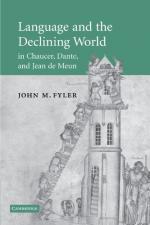|
This section contains 402 words (approx. 2 pages at 300 words per page) |
Encyclopedia of World Biography on Jean de Meun
The French author Jean de Meun (ca. 1240-1305) wrote the second, and longer, part of the "Romance of the Rose." His work is noted for its erudition and encyclopedic spirit.
Jean de Meun, also known as Jean Chopinel or Clopinel, was born in Meun-sur-Loire, the general region of Guillaume de Lorris, to whose Romance of the Rose he added 17,722 lines between 1269 and 1278. Afterward he translated Vegetius's Military Art, Boethius's Consolation of Philosophy, the Letters of Abelard and Heloise, Ailred's Spiritual Friendship, and Giraldus's Topography of Ireland and wrote at least two original works in verse: The Testament of Jean de Meun and The Codicil of Master Jean de Meun. He died in a comfortable house near the University of Paris, where he may have had some academic connection.
In Jean's continuation of the Romance of the Rose, Reason tries to dissuade the lover, but the god of Love later reproaches the lover for lending an ear to Reason. In the course of the lover's turmoil he has occasion to reflect, among other things, that possessions are burdens, that charity and justice are by no means equal, that power and virtue never go together, and that, even in destroying, Nature carries on her struggle against death. At last Love organizes an assault on the prison of the rose, depending on False Appearance for military success. The attack succeeds, and the lover receives the rose.
A résumé of many pages would be hopelessly inadequate, for Jean discourses on innumerable matters and draws from a great variety of sources, including the Bible, Plato, Aristotle, Livy, Virgil, Ovid, Horace, Juvenal, St. Augustine, Boethius, Roger Bacon, John of Salisbury, Alain de Lille, and Andreas Capellanus. Sometimes he reminds us of the scholastics, sometimes of the humanists, and often, with his interest in mining and alchemy, of the medieval scientist-philosopher.
In contrast with Guillaume de Lorris, Jean is bourgeois, extremely learned, realistic, a satirist, and a representative of another generation. Anticlerical and antimilitary, he is clear and eloquent, with didactic instincts that keep him from being negative; it is not surprising that he has been called the "Voltaire of the Middle Ages." Jean's antifeminism shows a curious crossing of the traditions of the fabliaux and of St. Jerome; in fact, there are precious few aspects of medieval life and thought which are not found in Jean's part of the Romance of the Rose.
|
This section contains 402 words (approx. 2 pages at 300 words per page) |


